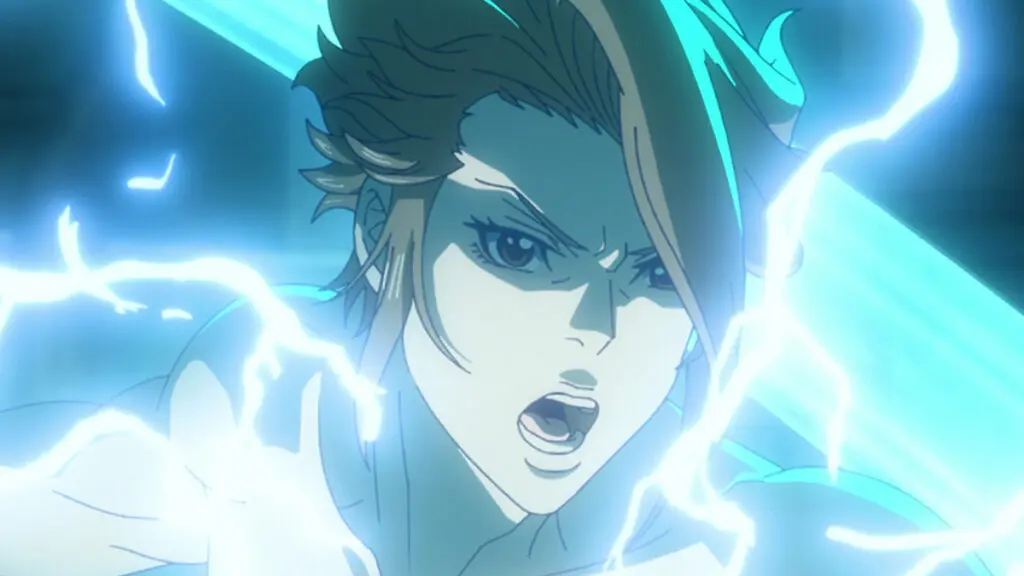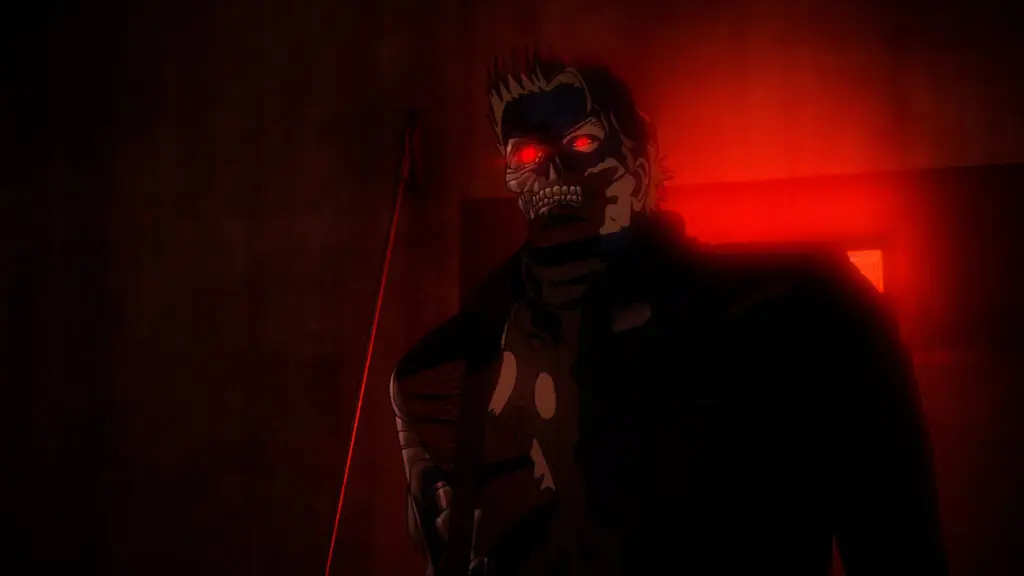Summary
Terminator Zero returns to the franchise’s horror roots while also weaving in some new elements. There are problems to be sure, but it’s nonetheless an exciting, action-packed thrill-ride with some things to chew on after it’s done.
It takes an effort to remember this now, but the Terminator franchise used to be pretty serious. There are two legitimate classics in that canon – 1984’s The Terminator, a terrifying sci-fi horror about a relentless, nigh-unstoppable cyborg assassin built like an Austrian bodybuilding champion, and 1991’s Terminator 2: Judgment Day, which formed a rubric for visual effects and action moviemaking that defined the next decade, at least. It is immediately obvious which of the two Netflix’s Terminator Zero most wants to emulate.
Mattson Tomlin’s eight-episode anime, produced by animation studio Production I.G and Skydance Television, leans heavily into that first movie’s now-iconic sense of menace. The atmosphere is closer to a slasher than anything else, with the usual Terminator iconography repurposed in its creepiest form. A red glowing eye peeping from behind a human face, wires and circuitry sparking at the end of a human appendage, the lighting, the atmosphere, the direction – Zero remembers that these things can be frightening.
If I had to highlight one thing that elevates this series, which is undeniably flawed and sometimes in the way that every Terminator entry released after T2 has been, it’s this. But there’s something else. We’ll get to that in a minute.
The bones of Terminator Zero make for a very familiar skeleton. In the past, someone threatens the existence of Skynet, the gestalt artificial intelligence that ravages the world with nuclear strikes and keeps the remnants of humanity in the iron grip of robot overlords. In response, Skynet dispatches a T-800 Infiltrator to 1997 Japan to eradicate the threat before it can do any damage.
At the same time, the human Resistance sends its own representative to ensure history remains unchanged. This is the formula that has been utilized in basically every Terminator story since the first one.
The threat in this case is Malcolm Lee, Zero’s Miles Dyson equivalent, although his invention is not Skynet but a rivalrous AI named Kokoro. Lee, who has been experiencing vivid and alarmingly accurate dreams of the coming Judgment Day and Skynet’s rise, believes that his own system can counter Skynet and perhaps talk some sense into it. But he’s reluctant to bring the system online because of its potential implications.
Kokoro is the other thing that gives Terminator Zero something specific within the established canon. For good chunks of the series, Lee has rather longwinded philosophical debates with Kokoro while he ponders whether to hit the switch or not. They discuss the nature of humanity and its relationship with technology a lot, which is more relevant in this setting than the usual L.A. backdrop. Japan has a unique relationship with technology that reframes the franchise’s usual concerns in a different cultural context. In the back half of the season, this manifests in other, sometimes quite unexpected ways that I won’t spoil.

Terminator Zero | Image via Netflix
But the meat of the show remains very recognizably on-brand. The T-800 provides a menacing threat as it shifts focus to Lee’s children, while the Resistance’s soldier, Eiko, slips neatly into the long list of badass, no-nonsense protectors from the future who have dotted the franchise. Interestingly, though, Zero offers a new wrinkle here too, with Misaki, Lee’s housekeeper/nanny, adopting a prominent role with real agency rather than just being dragged along as a damsel by the plot’s typical mechanics.
The series handles the action well. The animation allows for more exaggerated violence than usual, and also a sense of pleasing anime ridiculousness that works in context. The framing of the more horror-leaning elements works great, too. It’s a good-looking, exciting show, there’s little doubt about that.
Long-time franchise fans will quibble about some aspects of the mythology, which is equally certain, but it doesn’t seem prudent to get too bogged down in those matters. Zero operates best with prior knowledge of the series and references previous movies, but it’s largely designed to work on its own terms as a standalone story. The potentially multiversal implications of this might not sit well, but gone are the days when studios can afford to create something aimed exclusively at a passionate subset of fans and not a mainstream audience. And besides, the idea of preserving the sanctity of Terminator lore is a ridiculous proposition post-Genisys, which I say as someone who nonetheless really enjoyed Dark Fate.
A streaming anime take on a wildly successful AAA franchise is an intriguing business proposition since it’s almost impossible to tell how it might be received, how popular it might be, and to what extent fans of animation and fans of Terminator overlap. The more philosophical slant adds something new and the horror focus returns to something old, so you can’t even put a finger on what kind of Terminator fans will be most engaged by Zero. Maybe that’s the point.
But I’m a Terminator fan and I liked Terminator Zero quite a bit. There are problems on every level, an abundance of expositional dialogue perhaps most obviously, but the core package is a pacey and entertaining thrill ride that has a brain in its head. So, take that as you will.
RELATED:




